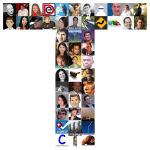Blogs.
Tweets.
Feeds.
Not too long ago if you had told someone that you spent a good chunk of your spare time with these things, they wouldn’t have had a clue what you were talking about.
As citizens of the new virtual landscape, we are pioneering new technologies at what seems like lightning speed.

It’s Hard To Fly Underwater
The ancient Greeks tell the story of Daedalus and his son Icarus. Trapped on the island of Crete (home the vicious and anatomically incorrect Minotaur), Daedalus skilfully crafted two sets of wings for him and his son thus enabling them to fly away off the island in an impressive escape.
But as they made their getaway, Icarus started to become quite enamoured with this new gift of flight. He flew higher and higher, closer and closer to the sun…
You know the story.
I think this parable could very easily be about our modern relationship with technology. Please, don’t get me wrong. I’m not against technology at all.
In fact, I’m madly in love with it. The new tools available to us today would have been unthinkable in any other period in history. It’s exhilarating to say the least.
But as we integrate more of these “tools” into our life, venturing deeper and deeper into the unknown, we have to realize we are taking a risk. We are flying higher without checking to look at the state of our wings.
Technology wants more and more of our limited time and resources. And as if right on cue, we keep on flying higher and higher, oblivious the wax melting all around us.
No one knew Twitter could spark a democratic revolution.
No one knew that blogs could provide news better and faster than traditional media outlets.
But no one knew either just how heavily addicted to and reliant on the internet we could become. No one knew that World of Warcraft could cost you your job or your marriage. No one knew that without warning their self-esteem could become dependent on how many anonymous “subscribers” or “page hits” they receive on a given day.
Who could have known?
I’m not here to bash technology. (This is after all, a pro-technology blog is it not?) But what I’d like to say is that in our adoption and usage of technology, new and old, we should be careful not to fly too high.
I wont pretend to have all the answers, but here are some guidelines to enjoy a smooth flight away from the evil Minotaur of the interwebs.
Take A Time-Out
Have you ever counted just how many hours you spend online?
Give your self a time-out every once in a while. My wife and I do our very best to be completely done with our computers by 9 pm every night so that we can actually spend some time together.
It’s shocking how hard that can be sometimes. But it’s amazing how much you can think of to do when you’re not on your computer.
Prioritize, Then Move On
Read only the blogs you want to read. Remove the bookmarks and feeds that aren’t quite contributing to where you want to go.
If you have too many sites and social media services in your diet, you are overfeeding yourself. Your body won’t be able to digest it all and it will start to make you sick, depressed, and lonely.
Figure out what is actually important to you and then swiftly and deliberately cut out all the rest. Do online what you came there to do and then move on to something else.
Discover Your Inner Chimp
Humans are social animals. The internet is a great playground, but it’s not always the ideal place to foster healthy and deep relationships.
We are genetically predisposed to want to interact with other human beings. Did I say want? I meant need.
An avatar will not provide the same warmth and connection as another person in the flesh. Find real live human beings in your neighbourhood to play with. I promise you they are more fun and they will (almost always) respond to your comments.
I’m no psychologist but the place where I find deepest and most lasting fulfilment? Yep, it’s offline.
Get Sober
About a month ago, I realized something was wrong. After about a year and half of being a die hard fan of Netflix, I realized that the amazing miracle of streaming movies and television had taken hold of me.
I was watching more than I planned to. It was keeping me up later than I wanted it to. And all of a sudden, it was hurting more than helping.
I love Netflix and think it’s a wonderful company. But it was time for it to go. I had to break the spell it had over me.
You see, I had a goal of reading more books and to improve my writing. But without sacrificing a few episodes of Burn Notice, this blog post would never have been written.
Find out what technological “tool” has a hold over you. Examine where your bigger goals are not matching up with your daily technology habits. Then get some freedom. Sober up.
It’ll be hard but it’s worth it.
Spread Your Wings
So what’s the big take away? Make sure that these new wings of yours are flapping for you.
Or in other words:
Make sure technology is your slave.
Otherwise you might unknowingly become its slave.
And if you are a slave to technology, the only place that will lead… is down.
Happy flying!
 As of today, the 13th of August 2011:
As of today, the 13th of August 2011:

